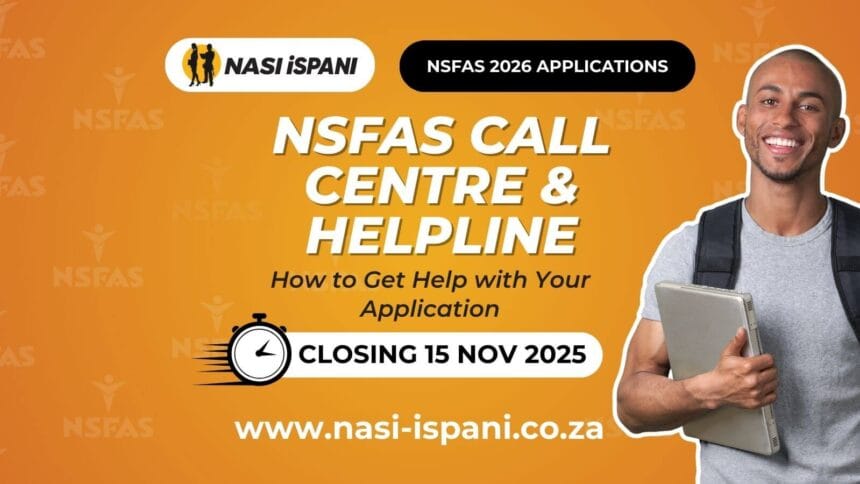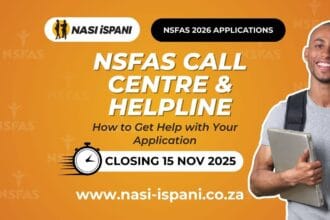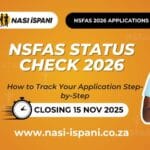Many students face frustration when applying for financial aid through NSFAS: login problems, documents rejected, status updates that don’t change, or disbursements delayed. These hurdles can stall your studies before they even begin. Navigating NSFAS on your own is often stressful, confusing, and time-consuming. Fortunately, NSFAS provides dedicated support through a call centre and helpline to help you resolve issues faster. This article shows you how to use the the NSFAS call centre and helpline effectively, what kinds of problems they can help you with, and what alternatives to try when the helpline isn’t enough.
Why the NSFAS Helpline Is Important
Huge demand & limited resources
Each year, tens of thousands of students apply to NSFAS for funding. The volume of applications means that many students will inevitably run into issues—whether with uploading documents, portal access, or funding disbursement. The helpline acts as a crucial bridge between applicants and the NSFAS administrative system, helping to lighten the load and ensure that issues aren’t left unresolved.
Common challenges students face
Some of the frequent challenges applicants report include:
- Delays in application processing or funding decisions
- Missing or incomplete documents (e.g. income affidavits, guardian documents, orphan/vulnerable child declarations)
- Rejected or unreadable uploads
- Portal login or access issues
- Bank account verification or stipend payments
- Appeal or reapplication queries
These issues, if left unaddressed, can derail a student’s ability to register, access courses, or even receive learning materials.
Role of the helpline in fairness & access
A well-functioning helpline helps level the playing field. Students from remote areas or with limited connectivity may not have easy access to campus financial aid offices. The helpline allows them to get direct support remotely. It also helps correct administrative oversights or system errors that could disqualify otherwise eligible students.
NSFAS Call Centre Contact Details
Here are the key official contact channels you should know, and how to make the most of them:
Official Contact Channels
- Toll-Free Number / Call Centre: 0800 067 327 (i.e. 08000 67327)
- Email Support:
- For general queries: info@nsfas.org.za
- For payment/account queries: collections@nsfas.org.za
- For fraud or ethics: speakup@nsfas.org.za
- Social Media Platforms:
- Facebook: National Student Financial Aid Scheme
- Twitter / X: @myNSFAS
- Instagram: @myNSFAS
- (Note: TikTok may also be used by NSFAS for announcements, though not primarily for individual support.)
- WhatsApp Line: +27 63 093 5671
- USSD Code: 12067327# (for basic status checks via mobile)
Best Times to Call & Tips for Preparedness
- Try calling early in the morning (shortly after the call centre opens) or midweek, when call volumes tend to be lower.
- Avoid lunch hours or late afternoons when lines are busiest.
- Before you call or message, have the following information ready:
- Your South African ID number
- Your NSFAS application reference number
- Your student number, if already registered
- Clear description of the issue (with dates)
- Any relevant documents or screenshots
Having all that ready ensures quicker resolution and avoids back-and-forth delays.
How to Use the NSFAS Helpline Effectively
Here’s a step-by-step guide to navigating the helpline (or other channels) successfully:
- Identify clearly what your issue is
Is it a status update, document upload problem, payment delay, appeal, or portal login trouble? Be as precise as possible. - Choose the right channel
- For quick clarifications or status checks: phone or WhatsApp
- For complex matters requiring documents or formal responses: email
- For public announcements or broad questions: social media
- If you already have a ticket number, use email (with the previous thread) for follow-ups
- Be concise and polite when explaining
- Start with: your name, ID number, application reference
- Then: a short sentence summarizing the issue
- Add key details only (e.g. dates, error messages)
- Avoid emotional venting—stick to facts
- Record everything
- If over the phone, ask for a ticket or reference number
- In email, keep a copy of the thread
- In WhatsApp or social media, note timestamps
- Understand response times
- Simple queries may be answered within 1–3 working days
- Complex or appeals may take longer (a week or more, especially in peak periods)
- If you don’t hear back within the expected window, send a polite follow-up referencing your ticket
- Escalate unresolved issues
- Use social media (e.g. tagging @myNSFAS in a post)
- Ask your campus financial aid office to intervene
- Visit a NYDA branch or regional NSFAS office in person
- Copy supervisors or higher management only when you have given the system fair time
Common Issues the NSFAS Helpline Can Resolve
Here are typical problems the helpline is able to help with—and what you should expect in each case.
Application Queries
- Status updates
E.g. “Application in evaluation,” “Awaiting documents,” “Under review,” “Rejected,” etc. The helpline can clarify which stage your application is in and what’s next. - Missing or incorrect details
If your application lists a mistake (wrong guardian, income, surname), they can advise on how to correct it or when to submit a change.
Document Submissions
- Uploading supporting docs
If you struggle with the PDF upload process (size, format, clarity), they can instruct you on correct formats or alternative methods. - Fixing rejected or unclear uploads
If a document was rejected (too faint, signature issues, unverified), the helpline can tell you exactly what to do to resubmit.
Funding & Payments
- Delayed disbursements
If your funding is approved but not reflected in your student account or bank account, the helpline can check whether there was a banking or verification issue. - Bank account verification/failure
If your bank account was rejected (incorrect details, verification failed), they can guide you on how to update or revalidate it.
Appeals & Reapplications
- Appealing a rejected application
The helpline can explain the appeals process through the myNSFAS portal and what documents to provide. - Guidance for reapplication
If you missed deadlines or were flagged for issues, they can clarify whether reapplication is possible and provide instructions.
Technical Support
- Portal / login issues
If you forgot your password, cannot log in, or get error messages, the helpline can assist in resetting credentials or diagnosing portal issues. - System errors / glitches
Sometimes, there are site outages or system bugs; the helpline can inform you whether there’s a reported issue and when it will be fixed.
Alternatives to the Call Centre
If calling or emailing the helpline doesn’t resolve your issue, or if wait times are long, these alternatives are helpful:
NSFAS Walk-in Centres / Regional Offices
NSFAS has regional or provincial offices and partners (e.g. through NYDA branches) where you can visit in person for assistance.
University / College Financial Aid Offices
Most tertiary institutions have a dedicated financial aid or student funding office. These staff often have direct contacts with NSFAS or can escalate your problem internally.
NSFAS Website & MyNSFAS Portal
You can use the portal to:
- Upload documents
- Track application status
- Submit appeals (where applicable)
- Access FAQ guides and system notifications
Always ensure you use the official NSFAS site to avoid scams.
Tips for Avoiding Delays When Contacting NSFAS
- Double-check documents before submission
Ensure PDFs are clear, readable, signed where required, and below maximum file size. - Use the correct reference/application number
Even a single wrong digit can send your query to the wrong file or lead to “account not found” errors. - Keep communication professional and consistent
Don’t send duplicate queries via multiple channels at the same time—this can slow things down. - Avoid contacting during peak season if possible
January–February (start of academic year) tends to be extremely busy for NSFAS. If your issue is not urgent, consider contacting slightly off-peak. - Follow up politely
If you don’t receive a reply within the stated time, follow up referencing your original ticket or email—not starting over again. - Backup your documents and screenshots
If a system crashes or you lose your upload, you’ll have backup files to resend.
Read more: What to Do If Your NSFAS Application is Stuck in ‘Evaluation’
FAQs
Q: What is the fastest way to get help from NSFAS?
A: For simple queries (e.g. “What’s my status?”), using WhatsApp or calling the helpline early in the day often works best. For issues needing documentation or escalation, email provides a clearer record and space to attach files.
Q: How long does NSFAS usually take to respond?
A: Simple queries may get responses within 1–3 working days. More complex matters, appeals, or verification tasks might take 5–10 working days or more, especially during busy seasons.
Q: Can I call NSFAS from outside South Africa?
A: Yes, but you’ll need to use the South African country code (+27) and possibly be charged international call rates. It’s often better to email or use WhatsApp (if available) in those cases.
Q: Can I submit an appeal or documents via WhatsApp?
A: Generally no — appeals and official documents must be submitted via the myNSFAS portal or via email. WhatsApp can be used for inquiries only.
Q: What if my ID or contact number has changed?
A: You’ll need to correct this in your myNSFAS profile or request a change via the helpline. Sometimes, in-person verification at a regional office may be required.
Q: What should I do if I receive no response even after following up?
A: Escalate via your institution’s financial aid office, visit an NYDA branch or regional NSFAS office, or publicly (respectfully) tag @myNSFAS on social media.
Q: Can the helpline help me with non-application matters (e.g. NSFAS living allowance)?
A: Yes, the helpline also deals with payments, stipends, bank verification, and related queries via the collections / accounts team.
Q: What hours does the NSFAS call centre operate?
A: The call centre usually operates during standard business hours, Monday to Friday (08:30 to 17:00). It’s best to call early in the morning or midweek to avoid long wait times.
Q: Can I check my NSFAS application status without calling the helpline?
A: Yes. You can log into your myNSFAS account online or use the USSD code 12067327# to check basic status updates without calling.
Q: What should I include in an email to NSFAS to get a quick response?
A: Include your full name, South African ID number, application reference number, student number (if applicable), a clear and brief description of the issue, and any supporting documents. This helps the team locate your record immediately.
Also check: NSFAS Forms 2026: Download, Complete & Submit Your Application Correctly
Don’t let confusion, technical issues, or delays derail your NSFAS funding journey. The NSFAS call centre and helpline are designed to help you—but only if you use them smartly. Be prepared with your ID, reference number, and a clear description of your problem. Choose the right channel (call, email, WhatsApp) for your issue. Keep records of all interactions, and don’t hesitate to escalate if necessary.
Save the NSFAS helpline details today and keep them handy through your entire application, registration, and funding period. You deserve the support—and with the right approach, you’ll be able to navigate issues quickly and get back to what matters most: your studies.




